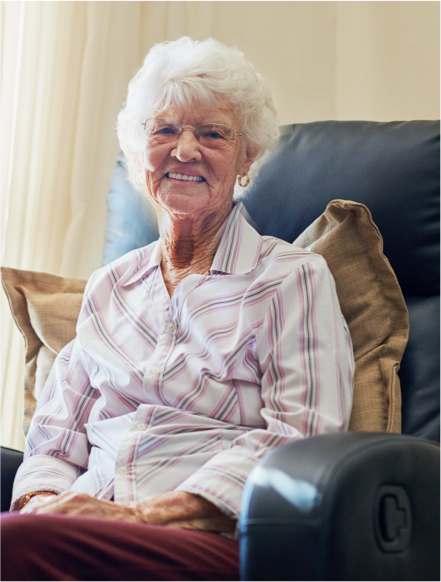Parkinson’s disease is a complex condition that requires a specific approach to care. When a loved one is diagnosed with Parkinson’s, it’s essential to make a care plan—this is the key to making sure they get the care they need.
When creating a care plan for someone with Parkinson’s disease, break it down into several categories:
- Communication
- Mobility and safety
- Nutrition
- Physical exercise
- Mental health
- Caregiver support
- Planning for long-term care
This multi-angled approach can make caregiving planning significantly easier.
Communication
Parkinson’s disease is a complex condition. In later stages, it often causes a condition called “dysarthria,” a speech disorder caused by damage to the nervous system.
When dysarthria develops, you may notice your loved one’s speaking patterns slowly start changing. They may speak softer than usual, or begin slurring their words together. This can make communication frustrating, so patience is essential.
Give your loved one time to express themselves in full, and try to avoid interrupting them or finishing sentences for them. Non-verbal communication can make a difference here—their gestures, facial expressions, and even writing can help you maintain your connection.
Remember, effective communication goes beyond words. If you’ve noticed your loved one is struggling to communicate, speech therapy might help to preserve their communication abilities.
Mobility & Safety
Parkinson’s disease can cause a host of physical challenges. It’s well-known for affecting movement, balance, and coordination. This can cause:
- Tremors
- Muscle stiffness
- Slowness of movement
- Impaired balance
These symptoms increase the risk of falls, which makes your loved one’s everyday life more dangerous. You’ll need to intervene before your loved one’s condition worsens to keep them safe.
Consider making some home modifications, like removing tripping hazards and installing railings. Adaptive products, like ergonomic kitchen utensils or raisable beds, can also help your loved one. You can even pick up a mobility aid—like a cane or a walker—to give them additional support and restore their independence.
Nutrition
A balanced diet is essential for managing Parkinson’s symptoms and improving overall health. Proper nutrition can help manage some of the complications of this condition, like weight changes and bowel problems.
Incorporate a variety of nutrient-rich foods into your loved one’s diet. Focus on:
- Fresh fruits and vegetables
- Whole grains for fiber
- Lean proteins like chicken, fish, or plant-based sources
- Dairy or fortified plant-based alternatives for calcium and vitamin D
- Healthy fats, such as nuts, seeds, and olive oil
Hydration is also important; encourage drinking plenty of water throughout the day. This gives your loved one the foundation of a healthier lifestyle.
Physical Health
However, nutrition is only part of the puzzle. Combining good nutrition with regular physical exercise is essential, so encourage your loved one to incorporate some senior-safe exercises into their schedule.
Encourage your loved one to incorporate regular exercises into an everyday routine. This will help keep their muscles strong, and offers a range of other benefits. Even simply stretching for a few minutes can help!
Activities like yoga and swimming can be particularly helpful, as they’re low-impact and low-resistance exercises that help your loved one maintain muscle mass. If you can, try working with a physical therapist to create a targeted treatment plan—this can also make a significant difference.
Physical therapy is key when your loved one starts experiencing mobility challenges. It’s not about strength—it’s about helping your loved one stay active and upright. This is crucial for a higher quality of life and maintaining independence.
Mental Health
The emotional toll of Parkinson’s can’t be overlooked. Both you and your loved one may notice symptoms of anxiety, depression, or burnout. Remember—mental health is just as important as physical health!
Make sure that you and your loved one have a strong support system in place. It helps to:
- Take breaks: Remember to rest and recharge to avoid burnout.
- Connect with others: Join support groups to share experiences and seek advice.
- Practice self-care: Prioritize your own health and well-being by exercising, eating well, and getting enough sleep.
Caregiver burnout is a significant problem, and it can have long-reaching effects on your life if you’re not careful. Being proactive and focusing on your own needs is an important part of maintaining your mental health.
If you ever feel constantly exhausted, burnt out, and frustrated, it’s time for a change. And a move to senior living may be the answer.

Planning for Long-Term Care
It’s important to remember that Parkinson’s disease is a chronic condition, and there may be a point when you can no longer safely care for your loved one on your own. This is why a proper care plan for Parkinson’s disease is so important.
Discuss your loved one’s future needs and wants as soon as possible. You’ll need to think about:
- Financial planning, such as insurance options, government benefits, and resources to cover future care costs
- Legal considerations, such as healthcare directives, insurance information, and power of attorney if needed
- Potential living arrangements, like assisted living and skilled nursing that offer Parkinson’s care
Starting these conversations may feel intimidating, but facing them early on can ensure your loved one will have the quality of care they deserve. It’s like having a grand plan in place if things get tough.
Meanwhile, this takes a significant amount of weight off your shoulders. You’ll have a roadmap for the future—no matter what it holds. This is an effective way to make sure your loved one will get the care they need when they need it.
Seeking Professional Help
Creating a care plan for someone with Parkinson’s disease takes some time, but it’s an important step. Communication, nutrition, physical exercise—these are all essential parts of a comprehensive care plan.
But why do all of the work yourself when we can help? At Inspired Living at Hidden Lakes, we’re ready to help your loved one each and every day in our community. Schedule a visit with us today to see for yourself!







